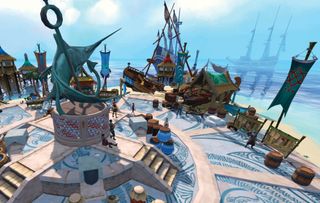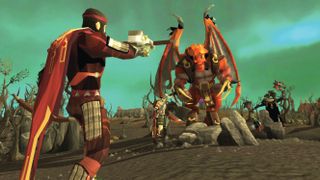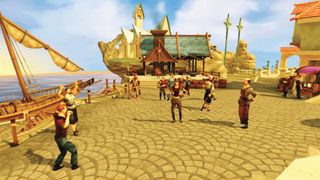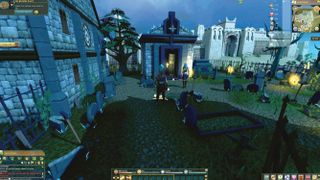The secrets of Runescape's rise
We learn about the 16-year-old MMO's allure from its venerable community of adventurers.

This article was originally published in PC Gamer issue 304. For more quality articles about all things PC gaming, you can subscribe now in the UK and the US.
RuneScape is a dark horse. It’s got enough players to support two versions of the game, has a convention in London, and last year got a card game spin-off. But unlike other MMOs that have managed to stand the test of time, it can be an enigma to those looking in. So what’s been keeping people chopping down trees and killing beasties all this time?
One of the common themes among the RuneScape players I’ve chatted to is that the game got its hooks into them when they were young, and they’ve stuck with it as it’s evolved over the course of the last 16 years.
“I’ve been playing RuneScape since 2002,” Brentmcclowd tells me. “Over the years I’ve always had times where I would get tired of the game or skilling and quit, only to come back a few months later and read the updates. Usually new minigames, or quest additions with rewards that would benefit me during game activities I was already fond of, would bring me back.”
In the early 2000s, before free-to-play was part of our common vernacular, RuneScape was a seductive prospect. No subscription fees, no need to buy game cards or pester parents for credit card details—diving in was easy. While things have changed and RuneScape now has a slightly more complicated business model, starting out remains just as simple as it was in 2001.

From character and account creation to killing your first zombie pirate in the game’s playful tutorial, all it takes is a couple of minutes. The NXT client can be downloaded, but it’s still possible to play RuneScape on a browser, just like the old days.
“RuneScape was one of the first MMOs I ever played, and it’s without a doubt the reason I am so into MMOs to this day,” explains another player, King Lir. Like Brentmcclowd, the updates keep him coming back. “Despite its age, RuneScape has incredibly frequent and large updates and has managed to keep itself modern and relevant for a huge length of time. The fact that even 16 years later the game still stands up to modern MMOs means I keep finding myself coming back to the original MMO I played to see what’s changed.”
PC Gamer Newsletter
Sign up to get the best content of the week, and great gaming deals, as picked by the editors.
Back in the early days, I remember taking the plunge and finding myself lost in a seemingly dangerous land. It was all a wee bit baffling. While danger still lurks around every corner of Gielinor, everyone I spoke with emphasised the value of the help they get from their fellow adventurers.
“In RuneScape other players are often nice,” says Cory H, Brentmcclowd’s brother. “There are mini-games where you have to work with one another and people will help because they are trying to train the same skill with you.”

Working together beyond the typical group-based monster-slaying diversions is so ingrained into RuneScape that it’s become a game mechanic through the Assist System. A player with a higher skill level can let a comrade ‘borrow’ their skill temporarily. This system replaced the ability to swap items with other players, so there’s no need for someone to give up their valuables. It’s one of the many changes that have transformed the game as it’s evolved over three iterations.
“It actually changed quite a lot,” Cryss Leonhart, who recently returned to RuneScape after a ten-year hiatus, tells me. “They [Jagex] made a lot of things a lot simpler, which is nice. The game is just relaxing; a breath of fresh air compared to other things I play. RuneScape goes at your own pace. Want to go bossing? Sure, do that. Want to collect your crops and AFK cut trees while doing something else? Same thing.
“Naturally, the developers have done things that people don’t really like. Historically you have the wilderness changes, which removed PvP as players knew it. In the old days, when people didn’t like the changes they rioted in-game. Everyone would group up in Falador, chanting. There wasn’t a Facebook page to complain on back then.”

Cryss was also surprised by the diversity of the community. “Most of the people in my guild have kids my age, it’s such a crazy contrast. They’re not people you’d really consider traditional gamers, but they’ve all sunk so many hours into it and help each other out. It’s a feeling you don’t really get anywhere else. The average age of our guild is around 50. We’re kind of a mix of people around my age, mid-20s, and people who have kids in their mid-20s.”
While a lot of players say they visit Gielinor to relax, RuneScape’s legacy as a hardcore MMO means that it also appeals to those on the other end of the spectrum. You can make an ironman character, only able to use items picked up as loot or crafted by yourself. And when you die your character is gone—as if it’s not a big enough deal that the whole server gets a message, along with the skill level of the now dead adventurer.“
People tend to be very passionate about games that they played as a child,” King Lir says as we finish chatting. “For a game that filled that role for someone to still be updated, modernised and still popular and active is a very special thing indeed.”

Fraser is the UK online editor and has actually met The Internet in person. With over a decade of experience, he's been around the block a few times, serving as a freelancer, news editor and prolific reviewer. Strategy games have been a 30-year-long obsession, from tiny RTSs to sprawling political sims, and he never turns down the chance to rave about Total War or Crusader Kings. He's also been known to set up shop in the latest MMO and likes to wind down with an endlessly deep, systemic RPG. These days, when he's not editing, he can usually be found writing features that are 1,000 words too long or talking about his dog.
Most Popular


